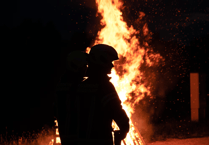PEOPLE visiting beaches over the October half term have been urged by the Royal National Lifeboat Institution to stay safe by visiting ones with lifeguards.
They say that there will be 20 lifeguarded beaches across the South West, including Woolacombe, Croyde and Bantham.
In partnership with local authorities and private beach owners, the RNLI is pleased to be able to provide lifeguard cover on a number of beaches later into the season, enabling people to enjoy the water safely in the autumn. The patrolled beaches are spread geographically around the south west coast, to enable people to choose a lifeguarded beach near to them. Guy Botterill Regional Lifeguard Lead said: ‘This time of year, the water is at its warmest and we tend to see an increase in swell, meaning bigger, more consistent waves, but this can also increase the frequency and power of rip currents.
‘As we reach the October half term with patrols ending on the beaches next weekend, we urge people to make best use of the beaches which still have RNLI lifeguard patrols and choose to visit one of these.
‘The lifeguards on duty can advise on local hazards and continually assess the conditions throughout the day positioning red and yellow flags in the safest area to swim and black and white flags in the safest area to surf.’
The RNLI advise to never visit a beach alone, and if going to a beach without lifeguards, to make sure you’re with someone who is carrying a mobile phone so that you can call for help should you need it.
If you go in the sea and find yourself in a rip current, don’t fight against it. If you can stand, wade do not swim to shore. If you can’t touch the floor and have the energy, swim parallel to the shore until you are out of the current.
If you don’t have the strength to swim, preserve your energy by floating. The RNLI’s Float to Live advice is:
· Tilt your head back with ears submerged
· Relax and try to breathe normally
· Move your hands to help you stay afloat
· It’s okay if your legs sink, we all float differently
· Spread your arms and legs to improve stability
If you get into trouble or see anyone else in difficulty along the coast, call 999 or 112 and ask for the Coastguard.
Key facts about the RNLI
The RNLI charity saves lives at sea. Its volunteers provide a 24-hour search and rescue service around the United Kingdom and Republic of Ireland coasts. The RNLI operates 238 lifeboat stations in the UK and Ireland and more than 240 lifeguard units on beaches around the UK and Channel Islands. The RNLI is independent of Coastguard and government and depends on voluntary donations and legacies to maintain its rescue service. Since the RNLI was founded in 1824, its lifeboat crews and lifeguards have saved over 142,700 lives.
Learn more about the RNLI
For more information please visit the RNLI website or Facebook, Twitter and YouTube. News releases, videos and photos are available on the News Centre.





Comments
This article has no comments yet. Be the first to leave a comment.